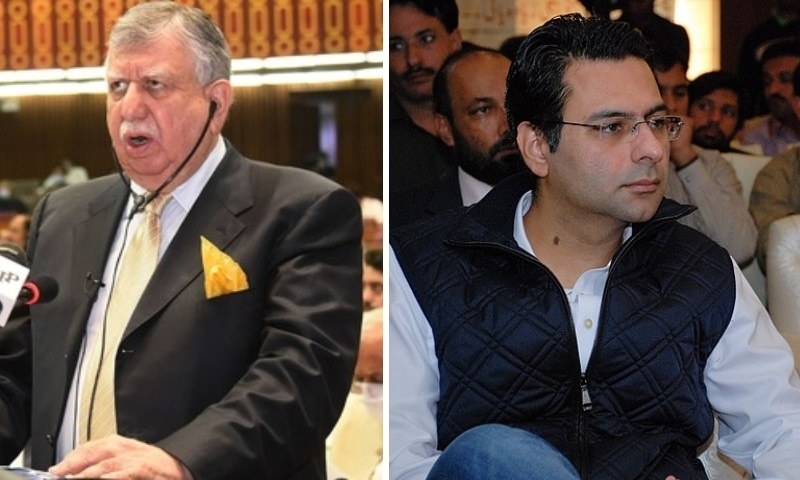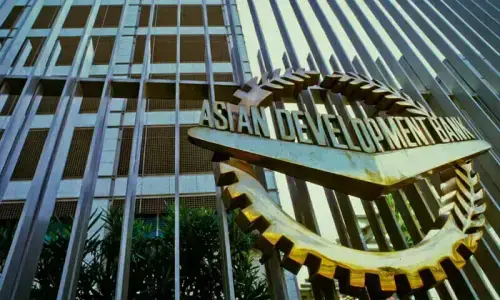The International Consortium of Investigative Journalists (ICIJ) on Sunday unveiled “Pandora Papers” — a major international research into the financial secrets held by high-profile individuals around the world.
The exposé named Finance Minister Shaukat Tarin, Senator Faisal Vawda, PML-Q leader Chaudhry Moonis Elahi, Ishaq Dar’s son, PPP’s Sharjeel Memon, the family of Minister for Industries and Production Khusro Bakhtiar, PTI leader Abdul Aleem Khan, Axact CEO Shoaib Sheikh, among others, among those with alleged links to offshore companies.
Geo News reported that more than 700 Pakistanis in total have been named in the investigation.
From Pakistan, investigative journalists Umar Cheema and Fakhar Durrani of The News International were part of the research.
The consortium released a report on the Pandora Papers titled "Prime Minister Imran Khan promised ‘new Pakistan’ but members of his inner circle secretly moved millions offshore."
According to the report, leaked documents revealed that "key members" of Prime Minister Imran's inner circle, including cabinet ministers, their families and major financial backers "have secretly owned an array of companies and trusts holding millions of dollars of hidden wealth".
"Military leaders have been implicated as well," it said, clarifying that the documents contained "no suggestion" that Imran himself owned offshore companies.
"The records also reveal the offshore dealings of a top PTI donor, Arif Naqvi, who is facing fraud charges in the United States," the ICIJ said.
Naqvi, the financier and major donor to Prime Minister Imran's 2013 election campaign, owned several offshore companies. The files show that in 2017, Naqvi transferred ownership of UK holdings – three luxury apartments, his country estate and a property in London’s suburbs – into an offshore trust operated by Deutsche Bank. Deutsche Bank declined to respond to ICIJ’s questions concerning the beneficiaries of the trust.
The next year, he presided over the spectacular collapse of his Dubai-based private equity firm, Abraaj Group, which also owns K-Electric.
US prosecutors charged Naqvi with engineering a $400 million fraud against Abraaj investors and this year persuaded a court to allow his extradition from the UK. Naqvi has denied wrongdoing.
According to the investigation's findings, Finance Minister Tarin and his family members own four offshore companies. It quoted Tariq Fawad Malik, a financial consultant who handled the paperwork for the companies, as saying that they were set up as part of the Tarin family’s intended investment in a bank with a Saudi business.
“As a mandatory prerequisite by [the] regulator, we engaged with the Central Bank of Pakistan to obtain their ’in-principle’ approval for the said strategic investment,” Malik said. The deal did not proceed.
Tarin didn’t respond to ICIJ’s questions, but in a statement issued today, he said: “The off-shore companies mentioned were incorporated as part of the fund raising process for my Bank.”
Meanwhile, Omer Bakhtiar, the brother of federal industries minister Khusro Bakhtiar, transferred a $1 million apartment in London's Chelsea area to his elderly mother through an offshore company in 2018, according to the ICIJ.
In a written statement to the consortium, Khusro said a Pakistani anti-corruption agency’s investigation against his family "was founded on baseless allegations which had underestimated his family’s past wealth", and that it had so far not resulted in a formal complaint.
Former minister for water resources Faisal Vawda set up an offshore company in 2012 to invest in UK properties, the Pandora Papers show. The now-senator told the ICIJ that he had declared all foreign assets held in his name to tax authorities.
The exposé further revealed that the son of former finance adviser to the prime minister Waqar Masood Khan co-owned a company based in the British Virgin Islands. Khan told the ICIJ that he did not know what his son’s company did and that his son lived a "modest life", and was not his dependent.
Military officers' dealings
The investigation revealed that "a luxury London apartment was transferred from the son of a famous Indian movie director to the wife of a three-star general". This was "one of several offshore holdings involving military leaders and their families", the ICIJ said.
The general told ICIJ the property purchase was disclosed and proper; his wife did not reply.
According to details, the wife of retired Lt Gen Shafaat Ullah Shah, a former aide to then-president Pervez Musharraf, acquired a $1.2 million apartment in London "through a discreet offshore transaction" in 2007.
The investigation found that the property was transferred to Lt Gen Shah's wife by an offshore company owned by Akbar Asif, the son of the Indian film director K Asif. Akbar himself is a businessman who owns restaurants in London and Dubai, the Papers reveal.
According to the report, the leaked documents showed that Asif owned a multimillion-dollar property portfolio through a web of offshore companies.
It was through one of these companies, Talah Ltd. — registered in the British Virgin Islands (BVI) — that Akbar transferred the London apartment to Shafaat Shah’s wife. The documents show that the apartment, located near the Canary Wharf financial district, was purchased by the company in 2006. The next year, Akbar transferred ownership of the company to Lt Gen Shah's wife.
Intrestingly, the investigation found that Akbar’s sister, Heena Kausar, "is the widow of Iqbal Mirchi, a senior figure in a leading organised crime group, D-company".
At the time, Mirchi was one of India's most wanted men and was under sanction as a drug trafficker by the US. He passed away in 2013.
According to the ICIJ report, Lt Gen Shah told the investigators that the apartment's purchase was made "through a former army colleague then acting as a consultant to London real estate firms, not through any personal connection to Asif". He added that the flat was purchased in his wife's name because “I already had properties in my name while she did not have any and to balance tax deductions”.
Lt Gen Shah further said that his wife had never met Akbar and that he had only met him once while an aide to then-president Musharraf. He revealed that the meeting happened when Akbar was lobbying for the release of his father's film “in the corridors of Dorchester Hotel when he had accompanied the hairstylist, who had come to cut Mrs Musharraf’s hair.”
According to the ICIJ report, Akbar had asked Musharraf to allow the release of one of his father’s movies in Pakistan, where there was a ban on Indian movies. "Musharraf granted the exception and later lifted the ban," the report states.
The Papers also reveal that Raja Nadir Pervez — a retired army lieutenant colonel and later-turned politician, who held various portfolios during the late 80s and early 90s — owned a company registered in the British Virgin Islands, International Finance & Equipment Ltd.
According to the leaked documents, "the firm is involved in machinery and related businesses in India, Thailand, Russia and China". In 2003, Pervez transferred his shares in the company to a trust that controls several offshore companies.
"One of the trust’s beneficiaries is a British arms dealer. According to UK court documents, one of the trust’s other companies has helped broker arms sales from Belgian manufacturer FN Herstal SA to Hindustan Aeronautics Ltd., a state-owned Indian defence company.
"While he owned International Finance & Equipment, Pervez also held several high-level positions in Pakistan’s government. He was elected to the National Assembly in 1985 and later joined Khan’s party. Pervez did not respond to reporters’ questions."
Another key former military leader whose name showed up in the Papers is retired Maj Gen Nusrat Naeem, the ISI’s onetime director general of counterintelligence. "He owned a BVI company, Afghan Oil & Gas Ltd, that was registered in 2009, shortly after his retirement. He said that the company had been set up by a friend and that he didn’t use it for any financial transactions."
According to the report, Islamabad police later charged Naeem with fraud related to the attempted purchase of a steel mill for $1.7 million, but the case was later dropped.
Meanwhile, the Papers also bring to light the notable offshore holdings of close relatives of three senior military figures.
"Umar and Ahad Khattak, sons of the former head of Pakistan’s air force, Abbas Khattak, in 2010 registered a BVI company to invest what documents call 'family business earnings' in stocks, bonds, mutual funds and real estate."
"In an example involving intergenerational wealth transfer, Shahnaz Sajjad Ahmad inherited a fortune from her father, a retired lieutenant general, through an offshore trust that owns two London apartments, purchased in 1997 and 2011 in Knightsbridge, a short walk from Harrods. She, in turn, set up a trust for her daughters in 2003 in Guernsey, a tax haven in the English Channel. Her father was a favourite of Field Marshal Mohammad Ayub Khan, the country’s first military dictator (1958-1969). After her father retired from the army, he founded one of Pakistan’s biggest business conglomerates. Ayub Khan’s son later married into the family and sits on the boards of several of the group’s businesses.
"Taken together, the findings offer a portrait of an unaccountable military elite with extensive personal and family offshore holdings," the report stated.
Allegations against Moonis Elahi
The files show how PML-Q leader Chaudhry Moonis Elahi, "a key political ally of Imran Khan’s, planned to put the proceeds from an allegedly corrupt business deal into a secret trust, concealing them from Pakistan’s tax authorities", according to the consortium.
A family spokesman for the Elahi family told ICIJ’s media partners that, “due to political victimisation misleading interpretations and data have been circulated in files for nefarious reasons.” He maintained that the family’s assets “are declared as per applicable law”.
Over 600 reporters, 117 countries
According to the consortium, the Pandora Papers is its most expansive exposé of financial secrecy yet, even larger than its predecessor, the explosive Panama Papers, which had set off alarm bells across the world.
More than 600 reporters from around the world, belonging to 150 media organisations spanning 117 countries, participated in the research for two years for the Pandora Papers, which contain 11.9 million files.
According to a Geo report, Pandora Papers are larger than the Panama Papers in terms of data collection and collaboration, made possible by the largest research team in the history of journalism in the world.
Earlier today, Information Minister Fawad Chaudhry said details revealed in the Pandora Papers would "further strengthen" Prime Minister Imran Khan's stance.
"Panama Papers revealed offshore assets of very corrupt people. Now another research of ICIJ is coming. PM Imran stressed upon rich countries that hiding of poor countries' money in rich countries should be discouraged," he said in a tweet.
When details of money being moved from poor countries to rich countries are shared through Pandora Papers, like the Panama Papers previously, it would "further strengthen" PM Imran's stance, he added.
Special Assistant to the Prime Minister on Political Communication Dr Shahbaz Gill, meanwhile, said: "Prime Minister Imran Khan has no offshore company."
Addressing a gathering in Faisalabad, Gill stressed that if any other member of the government was found to have hidden offshore assets, they would have to answer for themselves. "Everyone has to go into their own grave," he said.
































